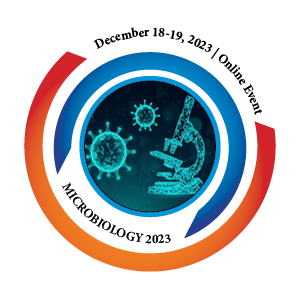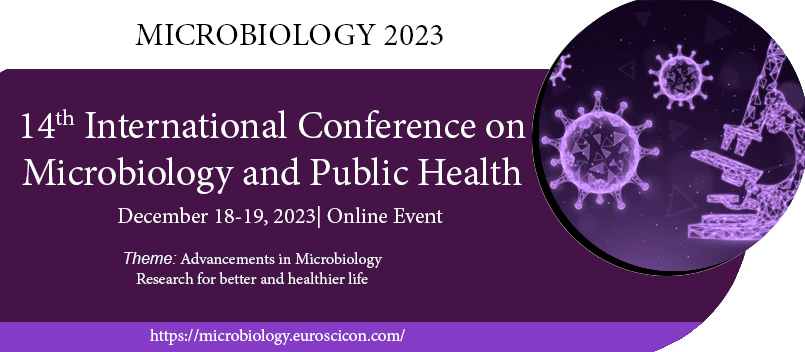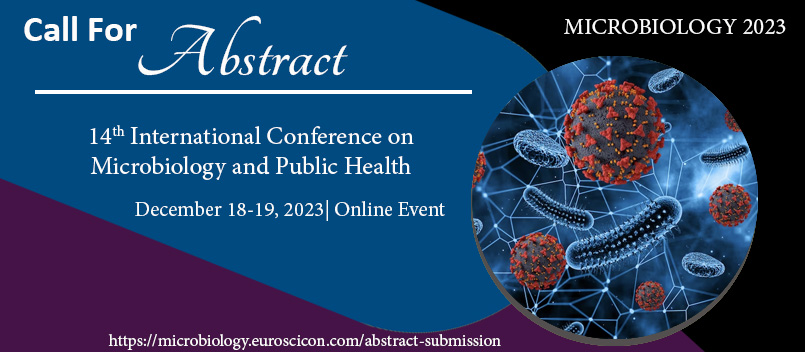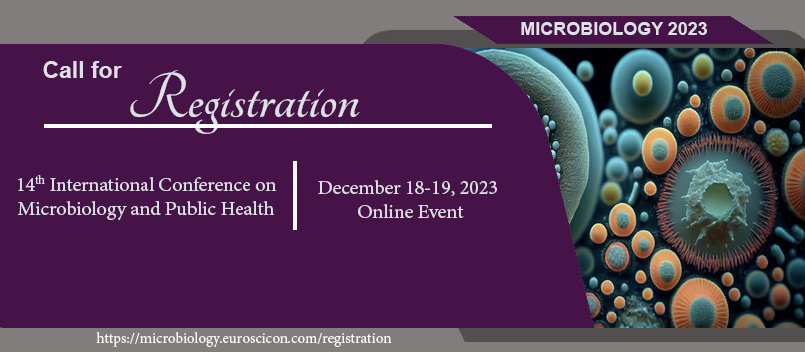MICROBIOLOGY 2023
About Conference
Euroscicon is proud to host a conference on Microbiology Webinar (Microbiology - 2023) taking place on December 18-19, 2023 Online Event. The conference is themed around “Advancements in Microbiology Research for better and healthier life”.
With the aim to bring together a wide audience of industry, healthcare, research, and medical practitioners to educate and bring about a fruitful debate on the confined topics.
The Microbiology 2023 will be a great event to network, learn and engage with professionals in the field of infectious diseases, virology, Biotechnology and Microbiology.
The Organizing Committee has done its best to set up a framework that we think will allow for a creative interplay of ideas. All we need now is to convert the extensive program on paper to an active and a vibrant forum in person through your active participation.
Who should attend?
Biotechnologist
Microbiology and Virology Students
Scientists
Microbiology and Virology Researchers
Microbiology and Biotechnology Faculty
Medical Colleges
Microbiology and Clinical Research Associations and Societies
Research Labs
Manufacturing Medical Devices Companies
Why to attend?
With members from around the world focused on learning about Microbiology and Public health and its advances; this is your best opportunity to reach the largest assemblage of participants from the Microbiology Research and Public Health community. Conduct presentations, distribute information, meet with current and potential scientists, make a splash with new Microbiology World-renowned speakers, the most recent techniques, developments, and the newest updates in Microbiology and public health are hallmarks of this conference.
Past Conferences Report
The Microbiology 2023 organized by EuroSciCon Ltd was held AS Webinar during December 18-19, 2023. Active involvement and generous comeback were received from the Organizing Committee Members, Editorial Board Members of EuroSciCon Ltd journals as well as from prominent Scientists, Researchers and Young Student community. Researchers and students who disclosed up from different parts of the globe have made the conference one of the most effective and prolific events in 2023. The conference was noticeable with the presence of renowned scientists, talented young researchers, students and business delegates motivating the two days event into the path of success with thought provoking keynote and plenary presentations highlighting the theme “Advancements in Microbiology Research for better and healthier life”
The meeting was carried out through various sessions, in which the discussions were held on the following major scientific tracks:
- Clinical Microbiology
- Virology
- Biotechnology
- Food Science
- Environmental microbiology
- Soil microbiology
- Immunology of viruses
- Application of microbiology and virology
- Food microbiology
- Plant virus
- Bacterial viruses
- Fungal viruses
- Viral vaccines
- Metabolic events may influence the pathogenesis of a virus infection
- Immunity or tissue damage to virus infections
The highlights of the meeting were the informative Keynote lectures from:
Honourable Guests, Keynote Speakers, well-known researchers and delegates shared their innovative research and vast experience through their fabulous presentations at the podium of Euro Microbiology 2023 Conference. We are glad to inform that all accepted abstracts for the conference have been indexed in EuroSciCon Ltd Journal of Archives of Clinical Microbiology as a distinct issue.
We are also obliged to numerous delegates, company representatives and other renowned personalities who supported the conference by their active discussion forums. We are thankful to the Organizing Committee Members for their gracious presence, continuous support and assistance towards the fulfilment of Microbiology 2023. With the exceptional feedbacks from the conference, EuroSciCon Ltd would like to publicize the commencement of the Microbiology 2023 December 18-19, 2023 as Webinar.
Sessions and Tracks
Track 1:Advanced Research In Microbiology:
This track deals with the inter disciplinary researches & developments in microbiologyand public health. Generally, Microbes play an important role in balancing the health in the society. This session covers the wide area of advanced researches under Microbiology, Epidemiology, Public Health, Clinical Microbiology, Diagnostic Microbiology, Environmental Microbiology, Astro Microbiology, Agriculture Microbiology, Food Microbiology, Molecular Microbiology, Industrial Microbiology, Microbiome, Infectious Diseases and their preventive Measures, Medical Microbiology and many more related fields.
Coronaviruses (COVID-19):
Coronaviruses are an outsized family of viruses which can cause illness in animals or humans. In humans, several coronaviruses are known to cause respiratory infections starting from the cold to more severe diseases like Middle East Respiratory Syndrome (MERS) and Severe Acute Respiratory Syndrome (SARS). The foremost recently discovered coronavirus causes coronavirus disease COVID-19.
Track 2: Advances in Applied Microbiology:
Applied Microbiology is that the field of study wherever the microorganisms wherever utilized in the assembly of bound product like Antibiotics, enzymes, Food product etc., for the profit for the society. Applied microbiology is that the study of the microbial world and therefore the approach it interacts with our own. It’s at however we are able to harness and utilize the powers of the microbes in areas starting from biotechnology to to persecutor management, to bio-refineries, to pharmaceutical applications. . a large vary of microbic bioproducts is feasible. This Applied Biolog session deals with researches in relation with agriculture and soils, animals and animal health, biodefense, biotransformation, biodegradation and bioremediation, biotechnology, setting, food and beverages, medication and public health, mycology, pharmacy, plants and plant health, and therefore the gut water of every type, Food Microbiology, Molecular Microbiology, Industrial Microbiology, Enzymes, Antibiotics, Vaccines, supermolecule Production, Recombinant DNA Technology.
Track 3: Advances in Microbiology:
Advances in Microbiology session deals with the latest researches and developments in microbial techniques, microbial strain improvement, microbial Engineering, Industrial Microbiology, Medical Microbiology, General Microbiology, Medical Entomology, Anatomy, Physiology, Biochemistry, Pathology, Forensic Medicineand Toxicology, Pharmacology, Community medication , Clinical Sciences (medication Surgery, ENT, orthopaedics, medical specialty,) Medical Biotechnology and Biological Sciences. Microbiology is that the study of microorganisms and people being animate thing (single cell), cellular (cell colony), or noncellular (lacking cells) like bacterium, viruses, archaea, fungi and protozoa. Microbiology encompasses varied sub-disciplines including virology, parasitology, mycology, bacteriology. Organic chemistry physiology cell biology ecology evolution and clinical aspects of microorganisms, as well as the host response to those agents. The study of microorganisms impinges on all of biology as well as geoscience. For several years, analysis exploitation prokaryotes from each the Bacteria and Archaea domains as model systems has additional to the understanding of physiological processes like growth and metabolism. Thus, through understanding the physiology of prokaryotes, advances in ecology, evolution, and biotechnologyare created. This Session conjointly covers sub sessions like.
Track 4: Discovery of Antibiotics:
Innovation has been a stimulating driver of advances in medication revealing. mechanization, Nano fluidics, imaging, programming and take a look at advances have assumed a stimulating half in showing signs of improvement data, quicker. Is medication revealing at such a propelled state, to the purpose that additional upgrades area unit failed to need any longer or practical? There area unit various feelings on this and an excellent a part of the proof is narrative, however innovation advancement is basic to the modification of the medication revealing method and value talking regarding.
Track 5: Applications of Microbes:
Microorganisms play a very important role in our day these days life, with those very little creatures. the employment of organism in giant scale production of food and industrial merchandise is being done worldwide. Polysaccharides, polyamides, polyesters several|and lots of|and plenty of} different sorts of biopolymers area unit made by many microorganisms. These area unit starting from plastics to viscous solutions. Microorganisms area unit employed in giant scale producing of vaccines against diseases like contagious disease respiratory illness, polio, BCG etc. with the evolution of refined technology, identification of specific antigens is being done simply that additional helps in development of vaccines with the assistance of microorganisms. they need employed in food merchandise, industries, pharma, technology, Biotechnology, Food Technology, Agriculture, Drug Delivery, Medical technology, microbic Engineering, protein Production, Antibiotics Production, immunogen Production and plenty of a lot of.
Track 6: Bioremediation and Biodegradation:
Bioremediation is that the method of exploitation organisms to neutralize or take away contamination from waste. it's vital to grasp that this kind of waste redress uses no deadly chemicals, though it's going to use Associate in Nursing organism that may be harmful below sure circumstances. Bioremediation may be a method wont to treat contaminated media, as well as water, soil and underwater material, by sterilization environmental conditions to stimulate growth of microorganisms and degrade the target pollutants. In several cases, bioremediation is a smaller amount high-ticket and additional property than different redress alternatives. Bioremediation works by providing these organisms with completely different materials like chemical, element and different conditions to survive. this could facilitate to interrupt the organic waste at a quicker rate. In different words, bioremediation will facilitate to wash up oil spills. Bioremediation from Associate in Nursing ecological perspective. microbic biodegradation is that the use of bioremediation and biotransformation strategies to harness the present ability of microbic xenobiotic metabolism to degrade, remodel or accumulate environmental pollutants, as well as hydrocarbons (e.g. oil), polychlorinated biphenyls (PCBs), polyaromatic hydrocarbons (PAHs), heterocyclic compounds (such as base or quinoline), pharmaceutical substances, radionuclides and metals. Interest within the microbic biodegradation of pollutants has intense in recent years and up to date major method breakthroughs have enabled careful genomic, metagenomic, proteomic, bioinformatic and different high-throughput analyses of environmentally relevant microorganisms, providing new insights into biodegradative pathways and also the ability of organisms to adapt to dynamic environmental conditions. Biodegradation is that the biologically catalyzed modification of Associate in Nursing organic chemical's structure.
Track 7: Drug Discovery Technologies in Antibiotics:
Innovation has been a motivating driver of advances in medication revelation. cybernation, Nano fluidics, imaging, programming and check advances have assumed a motivating half in showing signs of improvement data, quicker. Is medication revelation at such a propelled state, to the purpose that more upgrades area unit didn't need any longer or practical? There area unit numerous feelings on this and an excellent a part of the proof is narrative, nevertheless innovation advancement is basic to the modification of the medication revelation method and value talking concerning.
Track 8: Clinical Microbiology:
Clinical Microbiology is a branch of life science involved with the bar, identification and treatment of infectious diseases. Moreover, this field of science thinks {about|worries|is bothered} about varied clinical applications of microbesfor the development of health. There square measure four sorts of microorganisms that cause infectious disease: bacterium, fungi, parasites and viruses. During this session we are able to discuss in border read of microbiological aspects of human and animal infections and infestations and specifically their etiological agents, diagnosis, and epidemiology.
Track 9: Biotechnology:
Modern biotechnology provides breakthrough product and technologies to combat weakening and rare diseases, scale back our environmental footprint, feed the hungry, use less and cleaner energy, and have safer, cleaner and additional economical industrial producing processes. Biotechnology is that the broad space of science involving living systems and organisms to develop or create product, or "any technological application that uses biological systems, living organisms, or derivatives thence, to create or modify product
Track 10: Pathology:
Pathology is the medical discipline that provides diagnostic information to patients and clinicians. It impacts nearly all aspects of patient care, from diagnosing cancer to managing chronic diseases through accurate laboratory testing.
Track 11: Infectious Diseases:
Infectious diseases are disorders caused by organisms — such as bacteria, viruses, fungi or parasites. Many organisms live in and on our bodies.
Salmonella.
Tuberculosis.
Whooping cough (pertussis).
Chlamydia, gonorrhea and other sexually transmitted infections (STIs).
Urinary tract infections (UTIs).
E. coli.
Clostridioides difficile
Market Analysis
Market for Microbiology Testing Worldwide, By test type (Bacterial, Viral, Fungal), product (Instruments, Reagents), indication (Respiratory Diseases, Bloodstream Infections, Gastrointestinal Diseases, Sexually Transmitted Diseases, Urinary Tract Infection, Periodontal Diseases, Others), application (Pharmaceutical Applications, Food Testing Applications, Clinical Applications, Energy Applications, Chemical and Material Manufacturing Applications, Environmental Applications), and other criteria, the market is segmented into the following categories . End User: Industry Trends and Forecast to 2030 (Hospitals and Diagnostic Centers, Custom Lab Service Providers, Academic, and Research Institutes). At a CAGR of 5.9% from 2023 to 2030, the microbiology testing market is anticipated to reach $21.4 billion. In order to identify and limit hazardous microorganisms, microbiology tests are carried out in a variety of businesses, including the pharmaceutical, diagnostic, food and beverage, cosmetic, and other industries. In order to identify different microorganisms including bacteria, fungus, viruses, and protozoa, the study covers microbiology testing products like laboratory tools and analyzers, kits and reagents, and other products like petri dishes, pipettes, swabs, sterile pack bottles, and plates. Hospitals, diagnostic laboratories, quality assurance and analytical labs, as well as academic and research institutions, are the main users of these items. The burden of infectious diseases and epidemic outbreaks is rising, there are more regulations for microbial contamination in pharmaceutical and food & beverage manufacturing, microbiology testing technology is advancing, and there is more private-public funding for infectious disease research. These factors are driving this market's growth. Due to global operational constraints placed on numerous industries, the leading players active in the microbiological testing market initially saw their market share decline. The COVID-19 pandemic had a favorable effect on the global market for microbiology testing after the first decline, though, and it provided growth prospects for the major industry players. Microbiology testing became an essential weapon in the fight against the COVID-19 pandemic as concerns about health safety grew. The COVID-19 pandemic has compelled enterprises to establish strict Total Quality Assurance (TQA) procedures, which has raised the demand for microbiology testing in a variety of industries, including pharmaceutical, diagnostic, food & beverage, cosmetic, and other industries. Due to the low number of new COVID-19 infections and the expanding number of persons who have received the illness vaccine, many nations have eased the pandemic restrictions. Since many sectors have resumed normal operations, there is an increased need for microbial testing goods and services.
Learn More
Recommended Euroscicon Physical conferences:
In Europe:
5th International Conference on Oncology and Cancer to be held on December 14-15, 2023 in Rome, Italy.
For Registration Cancer Summit 2023
21st International conference on Novel Drug Design and Drug Delivery | September 21-22, 2023 in London, UK
For Registration: Drug Delivery 2023
4th International Conference on Probiotics and Nutrition to be held on September 13-14, 2023 Rome, Italy.
For Registration: Probiotic Nutrition 2023
Top Europe Universities:
University College London, University of Bristol, University of Silesia, Wroclaw Medical University, Bogomolets National Medical University, University of Zagreb, University of Cambridge, University of Sussex, University of Edinburgh, Kings College London, University of Brighton, Plymouth University, University of Exeter, Swansea University, University of Oxford, Swiss Federal Institute of Technology, University of Brighton, Ecole Polytechnique Federal de Lausanne
Microbiology Journals:
Act Virologist, Act Tropical, AIDS Book Review Journal, AIDS Patient Care and STDs, AIDS Research and Human Retroviruses, American Journal of Public Health, American Society for Microbiology News, Annals of Internal Medicine, Antimicrobial Agents and Chemotherapy, Antimicrobics and Infectious Diseases Newsletter, Apoptosis, Applied and Environmental Microbiology, Applied Biochemistry and Microbiology, Archives of Virology, BBA - Biochemical et Biophysical Act, BBA - Molecular Basis of Disease - Online Version, British Medical Journal – BMJ, Canadian Journal of Microbiology, Cell, Clinical Care Options for HIV, Clinical Microbiology Newsletter, Clinical Microbiology Reviews, Current Biology, Current Microbiology, Diagnostic Microbiology and Infectious Disease, Enzyme and Microbial Technology, FEMS Immunology and Medical Microbiology, FEMS Microbiology, International Journal of Antimicrobial Agents, International Journal of HIV & AIDS, Journal of AIDS/HIV, Journal of Antimicrobial Chemotherapy, Journal of Bacteriology, Journal of Clinical Virology, Journal of General Virology, Journal of Medical Virology, The Lancet, Microbiology, Nature, New England Journal of Medicine.




















